
Deacon Blue are a Scottish pop rock band formed in Glasgow during 1985. The line-up of the band consists of vocalists Ricky Ross and Lorraine McIntosh, keyboard player James Prime and drummer Dougie Vipond. The band released their debut album, Raintown, on 1 May 1987 in the United Kingdom and in the United States in February 1988. Their second album, When the World Knows Your Name (1989), topped the UK Albums Chart for two weeks, and included "Real Gone Kid" which became their first top ten single in the UK Singles Chart and reached number one in Spain. Deacon Blue followed up their success with their third album Fellow Hoodlums (1991) and the release of their fourth album, Whatever You Say, Say Nothing (1993).

"Puss"/"Oh, the Guilt" is a split single, released as a double a-side, from the American rock bands the Jesus Lizard and Nirvana, released via Touch and Go Records.

"I'm Coming Out" is a song recorded by American singer Diana Ross. It was written and produced by Chic members Bernard Edwards and Nile Rodgers, and released on August 22, 1980, as the second single from Diana’s self-titled eleventh album, Diana (1980).
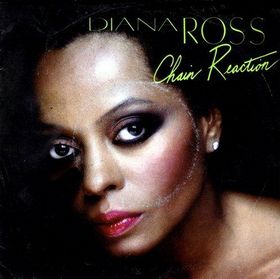
"Chain Reaction" is a song by American singer Diana Ross, released on November 12, 1985 by RCA and Capitol, as the second single from her sixteenth studio album, Eaten Alive (1985). The song was written by the Bee Gees and contains additional vocals from Barry Gibb. Sonically, "Chain Reaction" is an R&B and dance-pop song. According to the Gibbs' biography, the brothers had initial reservations about offering the song to Ross in case it was too Motown-like for her.

"Finer Feelings" is a song by Australian singer Kylie Minogue. It was the final release from Let's Get to It and was planned as the follow-up to "Word Is Out", but it was held back after the release of "If You Were with Me Now". "Finer Feelings" finally appeared in April 1992, remixed by Brothers in Rhythm, and narrowly missed out on the top 10, peaking at number 11 on the UK charts.
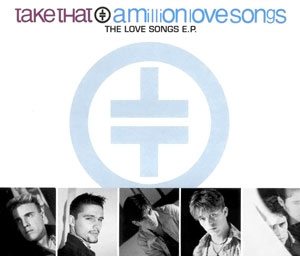
"A Million Love Songs" is a song by English boy band Take That that appeared on their debut studio album, Take That & Party (1992). The song was written by lead vocalist Gary Barlow. It was released in the United Kingdom on 28 September 1992 by Sony Music and peaked at number seven on the UK Singles Chart that October. It also reached number 50 in the Netherlands.
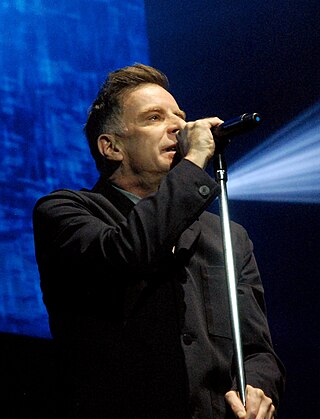
Richard Alexander Ross is a Scottish musician who is the lead singer of the rock band Deacon Blue. Alongside his discography with Deacon Blue, Ross has released a number of solo albums: his first, So Long Ago, was released in 1984.

Whatever You Say, Say Nothing is the fourth studio album by Scottish rock band Deacon Blue, released in March 1993 by Columbia Records. It was the group's final original album before their initial dissolution in mid-1994.

Our Town – The Greatest Hits is the first greatest hits compilation album by the Scottish rock band Deacon Blue. The album reached the top spot of the UK Albums Chart in May 1994 for two weeks, and has been certified Platinum. It was also their second and final number one album to date. It is also notable for being the 500th number one album since the charts inception in 1956.

"Wages Day" is a song by Scottish rock band Deacon Blue, released on 20 February 1989 as the second single from their second album, When the World Knows Your Name (1989). The song reached the top 20 in Ireland, Spain, and the United Kingdom. The main B-side is "Take Me to the Place", which is musically based on the hymn "Abide with Me" and the traditional melody "Eventide". Some versions of the single contain two songs: "Take the Saints Away" and a cover of Julian Cope's "Trampolene".
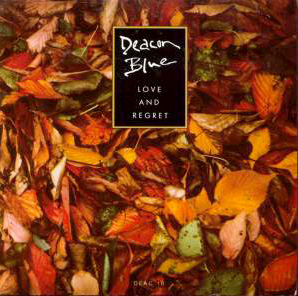
"Love and Regret" is the fourth single from the album When the World Knows Your Name by Scottish rock band Deacon Blue. The song was released on 4 September 1989. The main B-side of the single is "Down in the Flood", while some versions of the single contain the additional B-side "Undeveloped Heart", which Ricky Ross later re-recorded as a solo artist. A limited-edition four-track live Extended play (EP) single was released on 10-inch vinyl and CD formats at the same time as the standard singles.
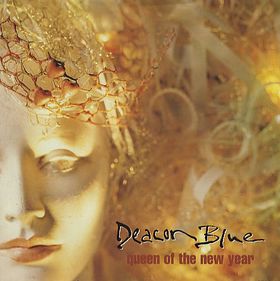
"Queen of the New Year" is the fifth and final single from the album When the World Knows Your Name by the Scottish pop rock band Deacon Blue.
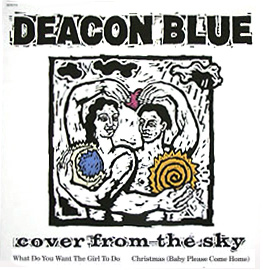
"Cover from the Sky" is the fourth and final single from Scottish band Deacon Blue's third studio album, Fellow Hoodlums (1991). It was the first single to be released with Lorraine McIntosh on lead vocals. The various versions of the single introduce three B-sides, all of which are covers. Various live or alternative versions of previously released Deacon Blue songs also span the different single versions. "Cover from the Sky" reached number 31 on the UK Singles Chart.

"Your Town" is the first single from Scottish band Deacon Blue's fourth studio album, Whatever You Say, Say Nothing (1993). Additional versions of the single release contain various dance remixes of "Your Town".
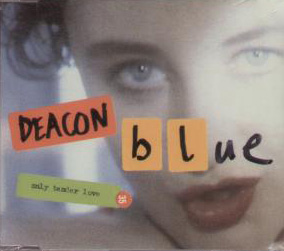
"Only Tender Love" is the third single from Scottish band Deacon Blue's fourth studio album, Whatever You Say, Say Nothing (1993). The song on the single is an edited version of the album track. Released by Columbia Records, it reached No. 22 on the UK Singles Chart in May 1993. The B-sides are "Pimp Talking" and "Cracks You Up".

"Hang Your Head" is the fourth and final single from Scottish band Deacon Blue's fourth studio album, Whatever You Say, Say Nothing (1993). It was written by Ricky Ross and produced by Steve Osborne and Paul Oakenfold. The single version was released in July 1993 by Columbia Records and is very similar to the album version, except that it has a slightly longer introduction and also has a cold start in place of the album version's fade-in. This was the first Deacon Blue single release to exclude all vinyl formats. It reached a peak of number 21 on the UK Singles Chart in July 1993.

"I Was Right and You Were Wrong" is the first single from Scottish band Deacon Blue's first greatest hits album, Our Town - The Greatest Hits. Produced by Steve Osborne, the song reached number 32 on the UK Singles Chart.

The discography of Scottish band Deacon Blue consists of ten studio albums, two live albums, seven compilation albums, and one album that is both a studio and a compilation album. As of 2020, Deacon Blue's total album sales stood at seven million, with twelve UK top 40 singles, along with two number one albums in the UK. Their debut album, Raintown (1987) reached number fourteen in the United Kingdom, and received a Platinum certification. It reached number fifty-four on the Dutch Album Top 100, and spawned the successful singles "Dignity", "Chocolate Girl" and "Loaded". Their follow up album, When the World Knows Your Name (1989), was a major success for the band, peaking at number one in the United Kingdom, achieving a double platinum certification. It charted in other European countries, including Sweden and Germany, and in international markets including Australia and New Zealand. Its lead single, "Real Gone Kid", peaked within the Top 10 of the UK Singles Chart, and peaked at number one in Spain and number five in New Zealand.

"Nobody" is a song by British singer-songwriter Shara Nelson, released in May 1994 as the fifth single from her first solo album, What Silence Knows (1993), through Cooltempo Records. The song peaked at number 49 on the UK Singles Chart and number 16 on the UK Dance Singles Chart.

"Escaping" is the debut solo single of New Zealand singer Margaret Urlich. The song was released in September 1989 by CBS and charted at number one for three weeks in the New Zealand singles chart, later reaching number 17 in Australia. It is the opening track on Urlich's debut album, Safety in Numbers (1989), and also features on her 1994 live album Live.




















